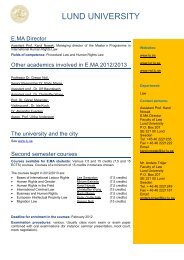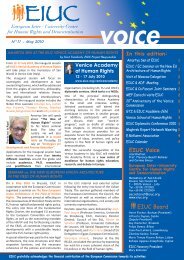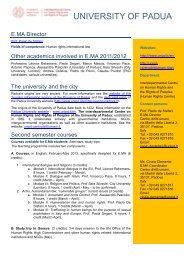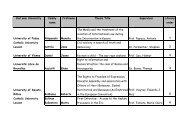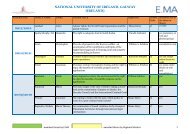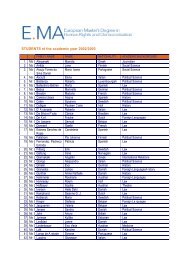study human rights mainstreaming in eu's external relations - EIUC
study human rights mainstreaming in eu's external relations - EIUC
study human rights mainstreaming in eu's external relations - EIUC
Create successful ePaper yourself
Turn your PDF publications into a flip-book with our unique Google optimized e-Paper software.
DG EXPO Policy Department<br />
It should be noted that the legal basis for the EIDHR has been adopted by co-decision with<br />
the European Parliament. The Parliament’s role <strong>in</strong> the follow-up of the implementation of<br />
the EIDHR by the Commission rema<strong>in</strong>s, however, limited. There might thus be scope for a<br />
greater <strong>in</strong>volvement of the Parliament <strong>in</strong> the evaluation of the implementation of this<br />
<strong>in</strong>strument. From a <strong>ma<strong>in</strong>stream<strong>in</strong>g</strong> po<strong>in</strong>t of view, such <strong>in</strong>volvement should ideally be done<br />
by associat<strong>in</strong>g the different EP committees.<br />
The European Instrument for Democracy and Human Rights (EIDHR)<br />
The EIDHR should not be seen as a <strong>ma<strong>in</strong>stream<strong>in</strong>g</strong> <strong>in</strong>strument as such, but<br />
rather as a <strong>human</strong> <strong>rights</strong> and democracy promotion <strong>in</strong>strument which is<br />
addressed to <strong>human</strong> <strong>rights</strong> actors and managed by <strong>human</strong> <strong>rights</strong> focal po<strong>in</strong>ts<br />
with<strong>in</strong> the Commission. Even so, if used efficiently, this <strong>in</strong>strument has the<br />
potential to re<strong>in</strong>force and enhance <strong>human</strong> <strong>rights</strong> <strong>ma<strong>in</strong>stream<strong>in</strong>g</strong>. Indeed,<br />
complementarity between the EIDHR and geographical <strong>in</strong>struments is clearly<br />
foreseen with<strong>in</strong> the legal basis of the EIDHR. One may thus advocate that the<br />
EIDHR should be deliberately used to further the <strong>ma<strong>in</strong>stream<strong>in</strong>g</strong> of <strong>human</strong><br />
<strong>rights</strong> with<strong>in</strong> the different sectors of activities covered by the geographical<br />
<strong>in</strong>struments. Initiatives undertaken <strong>in</strong> the framework of cooperation between<br />
the EU and third country authorities could often benefit from parallel actions<br />
undertaken by civil society organisations <strong>in</strong> relation to the same field, and viceversa.<br />
EIDHR may similarly contribute to the development of <strong>in</strong>tegrated approaches to<br />
<strong>human</strong> <strong>rights</strong> with<strong>in</strong> the <strong>in</strong>ternal structure of the EU, and more particularly of<br />
the Commission. For example, the <strong>in</strong>volvement of different services, both <strong>in</strong><br />
Brussels and at delegation levels, <strong>in</strong> the design and management of calls for<br />
proposals can be a factor contribut<strong>in</strong>g to more effective <strong>ma<strong>in</strong>stream<strong>in</strong>g</strong>.<br />
The fact that local NGOs are f<strong>in</strong>ancially supported by the EU also provides an<br />
<strong>in</strong>centive for Commission staff and EU Member States to get <strong>in</strong>volved, should<br />
representatives from these organisations suffer from <strong>human</strong> <strong>rights</strong> violations.<br />
This was, e.g., the case when funds allocated to the Tunisian League for Human<br />
Rights were blocked by the authorities <strong>in</strong> 2003. Even if the EU did not manage<br />
to resolve the problem, it was raised at the time at all possible levels. Several<br />
Member States as well as Commissioner Chris Patten raised the matter several<br />
times with the Tunisian authorities. Generally speak<strong>in</strong>g, however, it must be<br />
recognised that such action very much depends on the degree of commitment<br />
by staff and by the EC Head of Delegation to the promotion of <strong>human</strong> <strong>rights</strong>.<br />
F<strong>in</strong>ally, the Council has been keen to specify that the <strong>ma<strong>in</strong>stream<strong>in</strong>g</strong> of <strong>human</strong> <strong>rights</strong> <strong>in</strong>to<br />
<strong>external</strong> <strong>relations</strong> go hand <strong>in</strong> hand with the <strong>ma<strong>in</strong>stream<strong>in</strong>g</strong> of other <strong>human</strong> <strong>rights</strong>-related<br />
issues. In particular, the 2001 Council conclusions argue that “[t]he EU must apply a gender<br />
perspective throughout its <strong>human</strong> <strong>rights</strong> and democratisation policy, as well as child <strong>rights</strong><br />
38




